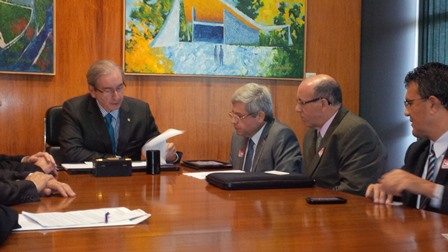
The main Brazilian entities in the ICT sector - ABES, Brasscom, Assespro, ABT (Brazilian Association of Teleservices), Sindpd (Union of Workers in Data Processing and Information Technology) and CSB (Central of Brazilian Unions), continue to be mobilized in order to modify the provisional measure 669/2015, which deals with payroll tax relief and provides for an increase in the rate for companies in this segment.
Representatives of the associations went to Brasília, on May 14, and met with Eduardo Cunha (PMDB-RJ), president of the Chamber of Deputies, and handed over to the parliamentarian a study showing that, in relation to the ICT sector (Information Technology) and Communication), including Call Center, law 12,546 increased the collection of social funds, that is, the government started to collect more than it did before the law in 2011.
“Data confirm that the sector has generated almost 200,000 new jobs, workers have been technically trained, company revenue has grown around 50% from 2011 to 2014, and revenues from IT service exports have also increased. The results were significant for the economy and, especially, for the population, with new jobs, income generation and qualification of the workforce”, Highlights Dr. Manoel dos Santos, legal director of ABES who participated in the meeting.
On the same day, the representatives also handed a copy of the study to Deputy Leonardo Picciani (PMDB-RJ), PMDB leader in the chamber who will present a substitute for the text of “PL 835/2015. The entire institutional effort aims to ensure that the ICT sector continues to collect 2% of INSS on gross revenue and does not need to pay the 4.5% that are provided for in the MP, maintaining its growth percentages and positive impacts for the country.
To prove the increase in revenue, the calculations made for the study delivered to the politicians considered: 2% of INSS on a 50% higher revenue; the INSS that is retained from workers hired during that period on the payroll; contributions to entities of the “Sistema S” (Sesc, Senac, unemployment insurance, education salary, etc.); deposits for FGTS; and the Income Tax that is paid by workers hired in that period.












